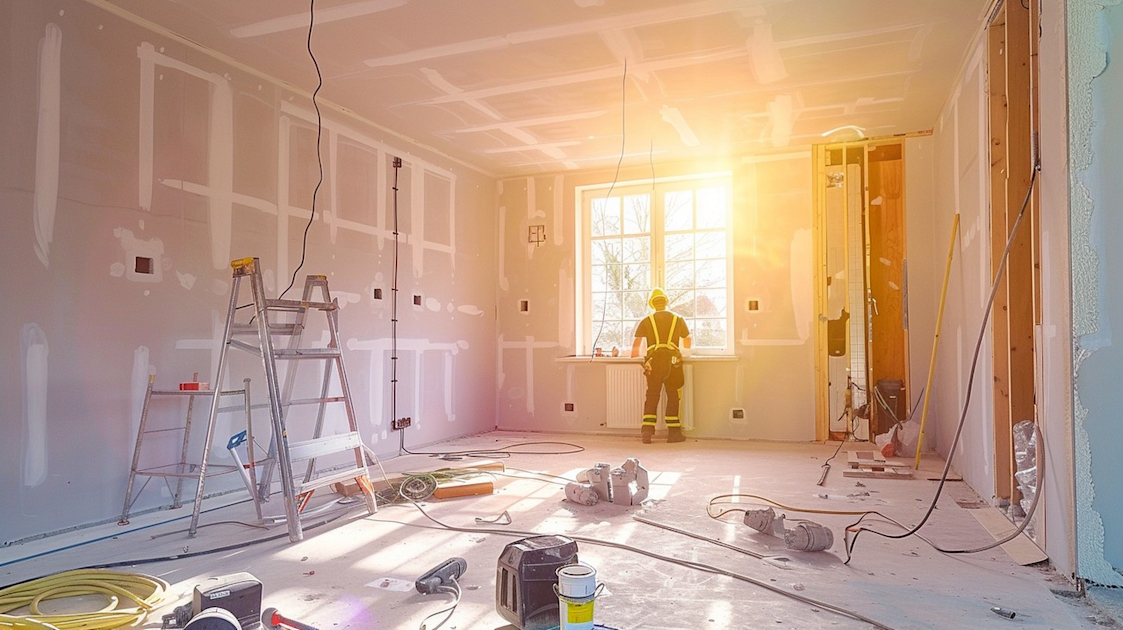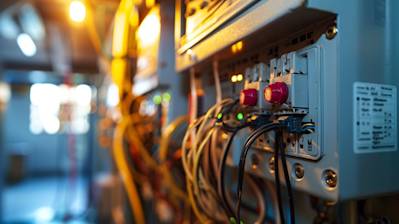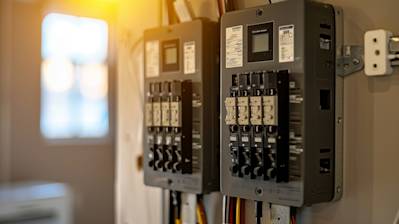Are you considering rewiring your house but unsure where to begin or how much to budget? Rewiring is a significant home improvement project, often necessary for safety and functionality. In this guide, we'll dive deep into the costs associated with rewiring a house and provide valuable insights to help you make an informed decision.
Understanding the Need for Rewiring
As homes age, their electrical systems become outdated, potentially leading to safety hazards. Rewiring ensures your home can support modern electrical demands and comply with current safety codes. If you've experienced flickering lights, frequent breaker trips, or have an older home with knob-and-tube wiring, it's time to consider rewiring.
Factors Influencing the Cost
Several elements influence the cost of rewiring a house. Understanding these factors can help you estimate your budget more accurately:
Home Size: Larger homes require more materials and labor, increasing costs.
Access and Layout: Homes with difficult-to-access wiring or complex layouts may incur higher labor costs.
Region: Labor costs and material prices vary by region, affecting your project's overall cost.
Material Quality: Opting for high-quality wiring and components can increase expenses but ensures longevity and safety.
Permits and Inspections: Compliance with local regulations often requires permits and inspections, which can add to the overall cost.
Average Cost Estimates
The cost to rewire a house can vary widely. On average, expect to pay between $3,000 and $8,000 for a standard single-family home. For a more detailed breakdown:
- Small Homes (1,000 sq ft): Approximately $3,000 to $5,000
- Medium Homes (1,500-2,000 sq ft): Approximately $4,000 to $8,000
- Large Homes (2,500+ sq ft): $8,000 and above
These estimates include labor and materials but may not cover additional expenses such as permits or electrical panel upgrades.
Breakdown of Costs
Let's break down the various components that contribute to the overall rewiring costs:
Materials: Includes wiring, outlets, switches, and potentially new circuit breakers or an upgraded electrical panel. High-quality materials can slightly increase the cost but are worth considering for durability.
Labor: Electricians typically charge on an hourly basis, with rates varying based on experience and location. Labor is often the largest portion of the rewiring budget.
Permits and Inspections: Obtaining the necessary permits and passing inspections ensure the rewiring meets local codes, which is crucial for safety and future home sales.
Additional Costs:
- Demolition and Repairs: Necessary if significant wall access is required.
- Upgrades: Upgraded panels or additional outlets might be necessary for older homes.
Hiring the Right Electrician
Choosing the right professional to rewire your house is critical to ensuring the job is done safely and efficiently. Here’s what to look for:
Licensed and Insured: Always hire a licensed electrician to ensure quality work and compliance with local regulations.
Experience: Electricians who specialize in residential rewiring can provide better quality and efficiency.
References and Reviews: Online reviews and references can give insights into the electrician’s reliability and workmanship.
Cost-Saving Tips
While you shouldn't compromise on quality, here are some ways to manage costs:
Plan Ahead: Carefully plan the rewiring project to avoid mid-project changes, which can increase costs.
Obtain Multiple Quotes: Get estimates from at least three different electricians to compare costs.
Combine Projects: Coordinate other planned renovations, such as drywall replacement, with the rewiring to save on labor.

FAQ: Cost to Rewire a House
How much does it typically cost to rewire a house?
The cost to rewire a house can vary significantly based on several factors. Generally, the price range is between $3,500 to $8,000 for a modest-sized house. This ballpark figure can shift based on the square footage, the age of the house, and the complexity of the job. Older homes may require additional work due to outdated wiring systems, increasing overall costs. Labor makes up a significant portion of the cost, as skilled electricians need to execute the rewiring, ensuring everything is up to code and safely installed.
What factors affect the cost to rewire a house?
Several factors influence the cost of rewiring a house. The size of the home is a significant factor; a larger house will require more materials and labor, increasing the overall cost. Accessibility is another critical element; homes with readily accessible wiring routes are cheaper to rewire than those with cramped or obstructed spaces. The condition of the existing wiring also plays a role; older systems may need more extensive repairs or replacements. Finally, regional labor rates can impact the final cost, with urban areas typically demanding higher prices.
Why is the cost to rewire a house higher in older homes?
The cost to rewire an older home is often higher due to several additional challenges. Older homes may have outdated wiring systems, like knob-and-tube or aluminum wiring, which need to be entirely replaced. In some cases, these homes may not meet current electrical codes, requiring additional upgrading and modifications that can increase costs. Additionally, the building materials and construction techniques used in older homes can make accessing and replacing wiring more difficult, requiring more labor-intensive work.
Can rewiring a house increase its value?
Yes, rewiring a house can increase its value, particularly in older homes with outdated electrical systems. Modern buyers prioritize safety and efficiency, and a new wiring system can be a major selling point. By bringing the electrical system up to code, homeowners can not only enhance safety but also improve home valuation. Additionally, newer electrical installations can support modern appliances and technology, which can be attractive to potential buyers. The investment made in rewiring often pays off by boosting the property's overall appeal and value.
Is it possible to reduce the cost to rewire a house?
Although rewiring a house can be expensive, there are ways to potentially reduce the costs. Obtaining multiple quotes from different electricians can ensure competitive pricing. You might also consider scheduling the work during the off-peak seasons when electricians may offer discounts. Additionally, preparing the house for the project by clearing access points and removing obstructions can save electricians time and potentially reduce labor costs. However, always ensure any cost-saving measures don’t compromise the quality and safety of the installation.
How long does it take to rewire a house and could this affect the cost?
Rewiring a house can take anywhere from a few days to a couple of weeks, depending on the size and condition of the home. The duration of the project can influence the cost, as longer projects will incur more labor costs. The complexity of the wiring needed and the accessibility of the current wires can also impact the time frame, thereby affecting the cost. Efficient planning and execution can help minimize downtime and associated costs, ensuring the project remains within budget. Time-efficient electricians may cost more upfront but save money in prolonged labor fees.
Are permits required when rewiring a house, and do they impact the cost?
Yes, permits are typically required when rewiring a house, as the work involves significant changes to the home's electrical system. Permits ensure that the work meets local building codes, which is essential for safety and compliance reasons. The cost of permits can add to the overall expense of the project but generally accounts for a small portion compared to labor and materials. It's always advisable to work with a licensed electrician who understands the permitting process and can include these fees in the initial estimate, preventing unplanned expenses.
How does the choice of materials affect the cost to rewire a house?
The choice of materials used in rewiring a house can significantly impact the cost. High-quality materials such as copper wires, though more expensive upfront, provide better conductivity and durability than cheaper alternatives. Complying with the latest codes might require specific types of materials, which can affect costs even further. Investing in robust materials can reduce future maintenance and repair costs, making it a cost-effective option in the long-term perspective. Consulting with a qualified electrician can provide insight into the best materials suited for your home and budget.

Cost Breakdown
Typical Price Ranges
The cost to rewire a house generally falls between $6,500 and $10,000 for a typical 2,000 square foot home. For smaller homes, you might spend as little as $4,000, while larger homes could push $12,000 or more. On average, homeowners report paying around $2 to $4 per square foot for rewiring services. These numbers can vary widely based on several factors, so let's dive into what can affect the final bill.
Factors That Affect Cost
Size of the Home: Larger homes require more materials and labor, so you'll see higher costs if you're wiring a sprawling estate compared to a compact cottage.
Age and Condition of the Existing Wiring: Homes with outdated or hazardous wiring can present additional challenges, potentially increasing labor time and requiring specialized disposal of materials.
Type of Wiring and Materials Used: Copper is the standard for most rewiring, but some homes may opt for aluminum. While copper is more expensive, it's also more reliable. Newer, high-tech wiring solutions can also drive costs up.
Complexity and Accessibility: Homes with extensive obstructions like drywall, plaster, or complex architectural features can increase time and labor costs due to the difficulty of installation.
Local Labor Rates: Electrician rates vary by region. In urban areas, expect to pay more due to higher demand and cost of living.
Permits and Inspections: Obtaining the necessary permits and scheduling inspections can add $200-$500 to the total price.
Cost Comparison (Budget vs Premium Options)
Opting for budget or premium options significantly affects the price of rewiring. Budget projects might focus on just replacing wiring without changing the panel or outlets, costing around $4,000 to $6,000. These projects may use less expensive materials, such as aluminum wiring, and may not include new fixtures or technologies.
On the other hand, a premium rewiring job could cost upwards of $12,000. This might include not only the replacement of existing wiring but also upgrading the electrical panel, installing smart home technologies, and choosing high-quality outlets and fixtures. Copper wiring, advanced circuit breakers, and comprehensive surge protection elevate both performance and price.
Hidden Costs to Consider
While the initial quote from an electrician might seem comprehensive, don't forget about potential hidden costs:
Repairing Walls and Ceilings: After rewiring, you'll likely need to patch and paint walls and ceilings that have been opened up. This can add several hundred to thousands of dollars, depending on the extent of the work.
Temporary Housing or Lodging: If the rewiring takes several days, you might need to stay elsewhere, adding accommodation costs.
Unforeseen Complications: Older homes might reveal unexpected issues like asbestos, which require specialized removal procedures and additional costs.
Ways to Save Money
- Plan for Off-Peak Times: Electricians are often less busy during the winter months, which might lead to discounted rates.
- Combine Projects: If you plan other renovations, consider bundling them with the rewiring to save on labor and materials.
- Do Some Prep Work Yourself: Clearing access to wiring or ensuring that areas are free of furniture can reduce the time your electrician spends on the project.
- Get Multiple Quotes: Don't settle for the first estimate. Compare quotes from at least three different electricians to ensure competitive pricing.

Timeline & Process
Phase 1: Initial Assessment and Planning (1-2 weeks)
What Happens:
This phase involves assessing your current electrical system and planning for the new wiring. A licensed electrician will visit your home to evaluate the current setup, discuss your needs, and possibly perform an initial safety inspection.
Dependencies and Waiting Periods:
Your schedule depends on the availability of the electrician. It’s a good idea to book this appointment in advance, especially during peak home renovation periods.
Preparation:
Start by compiling a list of your electrical needs and any specific upgrades you want. Check online reviews or get recommendations to find a reliable electrician. Gather any documentation you have about your current wiring, such as blueprints.
Phase 2: Design and Permitting (1-3 weeks)
What Happens:
Once you've settled on a plan, the electrician creates a design outlining the new wiring system, including the placement of outlets and switches. This phase also involves applying for necessary permits from local authorities.
Dependencies and Waiting Periods:
Permit approval can vary by locality; some areas might be quicker than others. In general, expect a wait of at least a week, though it can be longer.
Preparation:
Ensure that all paperwork is ready and complete to avoid delays. Keep your phone handy for any questions that may arise during this period. It's also wise to contact your local government or homeowner’s association to learn about specific regulations.
Phase 3: Site Preparation and Material Procurement (1 week)
What Happens:
Your electrician will order the materials needed for the project. You might need to clear specific rooms or areas in your house to provide easy access to walls, ceilings, and floors.
Dependencies and Waiting Periods:
Material availability can impact this phase, so it is crucial to confirm with your electrician that all necessary materials will arrive on time.
Preparation:
Take time to remove or cover furniture and other belongings to protect them from dust and potential damage. It's also a good moment to arrange for temporary accommodations if extensive work is happening in critical living areas.
Phase 4: Demolition and Rough-In Wiring (1-2 weeks)
What Happens:
Electricians begin by removing old wiring and installing new cables. This phase might involve cutting into walls and ceilings or drilling through floors.
Dependencies and Waiting Periods:
Progress might depend on the structural conditions of your home. Unforeseen issues, such as hidden pests or mold, could cause delays.
Preparation:
Make sure children and pets are kept safe from active work areas. Discuss any concerns or preferences regarding dust control and work schedules with your electrician before the rough-in begins.
Phase 5: Inspection and Final Adjustments (1-2 weeks)
What Happens:
Once rough-in wiring is complete, an inspector comes to ensure everything complies with local codes. After approval, electricians make final adjustments and install fixtures, outlets, and switches.
Dependencies and Waiting Periods:
Inspection scheduling can affect this stage. It usually takes a few days to coordinate with inspectors and receive a final review.
Preparation:
Keep in touch with your electrician to ensure they coordinate the inspection. Be prepared to be on-site during inspections if required by local codes.
Phase 6: Final Walkthrough and Clean-Up (1 week)
What Happens:
The electrician will walk you through the completed work, explaining any new systems or features. They will also ensure all debris is cleared and workspaces are tidy.
Dependencies and Waiting Periods:
Not much downtime here, but you may want to schedule any final payments or reviews promptly so there are no delays.
Final Thoughts
Understanding the cost to rewire a house is crucial for homeowners looking to enhance safety and functionality. While the exact price can vary based on factors like the size of your home, the complexity of the project, and local labor rates, investing in a thorough electrical upgrade can pay off in both comfort and peace of mind.
We encourage you to reach out to us at Sagan Electric if you're considering this important project. As your trusted local experts serving homeowners in Sacramento, CA, we can provide you with a detailed consultation and help you navigate the process smoothly. Request a free estimate today and let’s make sure your home is safe and efficient for years to come.
Tags: rewiring, house, cost,








